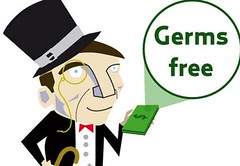
PREV ARTICLE
NEXT ARTICLE
FULL ISSUE
PREV FULL ISSUE
DIRTY MONEY: BANKNOTES REFLECT NATIONAL WEALTH
Dutch scientists recently studied germs on circulating banknotes from around the world.
-Editor
Dutch scientists examined 1,280 banknotes from 10 countries, among them Australia, China, New Zealand, Nigeria, Burkina Faso, the UK and the US. The banknotes were collected from a range of food outlets, including shops and snack bars, said scientist Rijkelt Beumer. They were then subjected to a thorough examination to identify bacteria. The researchers found a strong correlation between the number of bacteria per square centimetre on a banknote and a number of indicators of economic wealth in the various countries. The lower a country scores on the "index for economic independence", the more bacteria that were found on its banknotes, Beumer said. However, the researchers only found low concentrations of pathogenic bacteria on the banknotes, and there was no evidence of alarming high numbers anywhere. He said that the material used to produce the banknotes is also important. Cotton is used in most banknotes, such as the euro or the dollar. Although this initially makes it difficult for bacteria to take hold, the researchers only found a quarter of the bacteria on banknotes manufactured on a polymer substrate basis (used in countries with a hotter climate, such as Australia) as they did on banknotes made from a cotton-based material.
To read the complete article, see:
Banknotes reflect national wealth
(gulfnews.com/business/general/banknotes-reflect The Numismatic Bibliomania Society is a non-profit organization promoting numismatic literature. See our web site at coinbooks.org. To submit items for publication in The E-Sylum, write to the Editor at this address: whomren@gmail.com To subscribe go to: https://my.binhost.com/lists/listinfo/esylum All Rights Reserved. NBS Home Page Contact the NBS webmaster 
|
